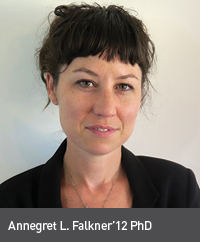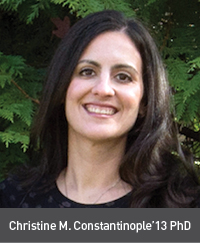Two PhD Grads Receive New Innovator Awards from NIH
Annegret L. Falkner and Christine M. Constantinople were among 53 recipients of NIH Director’s New Innovator Awards announced in October 2020. The New Innovator Award was established in 2007 to support unusually innovative research from early career investigators who are within 10 years of their final degree or clinical residency.
The awards are part of the NIH’s High-Risk, High-Reward Research Program that funds innovative and impactful biomedical or behavioral research proposed by creative scientists. The program catalyzes scientific discovery by supporting research proposals that, due to their inherent risk, may struggle in the traditional peer-review process despite their potential. Program applicants are encouraged to think “outside the box” and to pursue trailblazing ideas in any area of research relevant to the NIH’s mission to advance knowledge and enhance health.
 Dr. Falkner received her PhD in neuroscience in 2012. She is assistant professor at the Princeton Neuroscience Institute, where her lab focuses on understanding how social experiences, including social dominance and defeat, lead to the generation of persistent affective states. Her New Innovator Award project is titled “Generating Pro-Resilient States Through Individualized Circuit Read-Write Therapeutics.” Her other honors include an NIH Pathway to Independence Award, a NARSAD Young Investigator’s Award, and an Alfred P. Sloan Research Fellowship.
Dr. Falkner received her PhD in neuroscience in 2012. She is assistant professor at the Princeton Neuroscience Institute, where her lab focuses on understanding how social experiences, including social dominance and defeat, lead to the generation of persistent affective states. Her New Innovator Award project is titled “Generating Pro-Resilient States Through Individualized Circuit Read-Write Therapeutics.” Her other honors include an NIH Pathway to Independence Award, a NARSAD Young Investigator’s Award, and an Alfred P. Sloan Research Fellowship.
 Dr. Constantinople received her PhD in neuroscience in 2013. She is assistant professor in the Center for Neural Science at New York University, where she uses a variety of circuit-based approaches to understand how animals assign value to different actions and outcomes and use those value estimates to guide behavior. The title of her funded project is “Neural Circuit Mechanisms of Arithmetic for Economic Decision-Making.” Her other awards include an NIH Pathway to Independence Award, an Alfred P. Sloan Research Fellowship, and the Klingenstein-Simons Fellowship Award in Neuroscience.
Dr. Constantinople received her PhD in neuroscience in 2013. She is assistant professor in the Center for Neural Science at New York University, where she uses a variety of circuit-based approaches to understand how animals assign value to different actions and outcomes and use those value estimates to guide behavior. The title of her funded project is “Neural Circuit Mechanisms of Arithmetic for Economic Decision-Making.” Her other awards include an NIH Pathway to Independence Award, an Alfred P. Sloan Research Fellowship, and the Klingenstein-Simons Fellowship Award in Neuroscience.
- Log in to post comments

